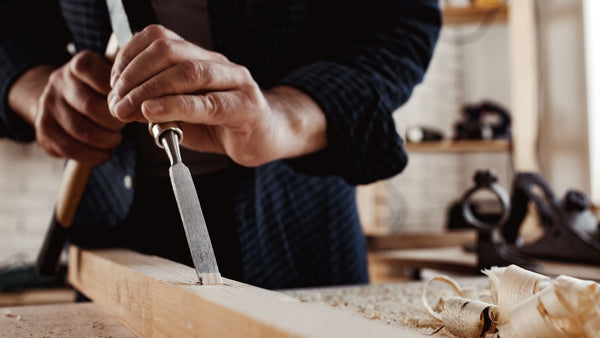Types of Wood Chisels Explained: Japanese Nomi & Western Styles

Jump to:
Whether you're crafting delicate joinery or shaping a block of hardwood into a work of art, the wood chisel is one of the most indispensable tools in a woodworker’s arsenal.
In Japan, chisels, known as Nomi, have long been revered for their precision, craftsmanship, and enduring sharpness. Their thoughtful design and high-quality materials make them essential not only for traditional carpentry but also for modern woodworking projects of all kinds.
This article will guide you through the different types of wood chisels, their uses, and where to find the best quality options in Japan.
Different Types Of Wood Chisels
Wood chisels come in many shapes and sizes, each designed with a specific purpose in mind. From general joinery to delicate detailing, understanding the different types will help you choose the right tool for every task in your workshop.
1. Bench Chisel (Oire-Nomi) – Best for Everyday Woodworking

The Oire-Nomi, or bench chisel, is the most common and versatile chisel. With a medium-length beveled blade, it handles trimming, chopping, and general joinery. Best for beginners and professionals alike, it’s the foundation of any woodworking toolkit, used daily for a wide range of tasks.
2. Butt Chisel – Best for Cabinetry and Tight Spaces

Butt chisels are short, compact versions of bench chisels. Their reduced length provides greater control when working in confined spaces. Best for cabinetry, hinge fitting, and small adjustments, butt chisels excel in fine furniture making where precision matters more than reach.
3. Mortise Chisel (Ana-Nomi / Tataki-Nomi) – Best for Strong Joinery

Mortise chisels, known in Japan as Ana-Nomi or Tataki-Nomi, are thick, heavy-duty tools designed to withstand repeated mallet strikes. They cut deep, square-sided mortises essential for mortise-and-tenon joinery. Best for structural woodworking and furniture making, these chisels excel when durability and strength are the top priorities.
4. Paring Chisel (Ashi-Nomi) – Best for Precision Joinery

The Ashi-Nomi, or paring chisel, is long, thin, and always hand-guided rather than struck. It delivers whisper-thin shavings for dovetail adjustments, inlay work, and fine trimming. Best for precision joinery, the Ashi-Nomi is essential when smoothness, control, and accuracy are needed for perfect-fitting joints.
5. Flat Chisel (Hira-Nomi) – Best for Smoothing Surfaces

The Hira-Nomi is Japan’s flat chisel, broader and flatter than the Oire-Nomi. It’s designed for smoothing and leveling larger surfaces. Best for flattening boards, cleaning up joints, and general surface preparation, it brings accuracy and consistency to wide woodworking areas.
6. Carving Chisel (Maru-Nomi and Variants) – Best for Decorative Detailing

Carving chisels come in many forms, including gouges, veiners, and V-tools. In Japan, the Maru-Nomi gouge chisel is especially common. Operated by hand, they allow delicate control for shaping wood. Best for artistic carving and ornamentation, these chisels unlock creativity and detailed expression in woodwork.
7. Turning Chisel – Best for Woodturning Projects

Turning chisels are long-handled tools used on a lathe, including gouges, skews, and parting tools. They shape spinning wood into bowls, pens, and spindles. Best for woodturners, turning chisels combine durability with control, producing smooth, symmetrical forms under continuous high-speed contact.
8. Side Chisel (Waki-Nomi) – Best for Cleaning Corners

The Waki-Nomi, or side chisel, has beveled side edges for reaching tight corners. It’s ideal for cleaning out mortises and internal recesses where straight chisels can’t reach. Best for joinery, the Waki-Nomi ensures crisp, square internal corners with precision.
9. Chamfer Chisel (Mentori-Nomi) – Best for Beveling Edges

The Mentori-Nomi features a slanted, angled cutting edge designed to cut chamfers and bevels. Best for decorative detailing, it’s used to add smooth angled edges or finish work. This specialized chisel balances practicality with aesthetics, enhancing both form and craftsmanship.
10. Corner Chisel – Best for Squaring Corners

Corner chisels have an L-shaped blade with two edges forming a perfect right angle. They’re used to square inside corners of mortises and housings. Best for carpentry and cabinetry, corner chisels provide crisp internal corners that flat chisels alone cannot achieve.
11. Cranked Neck Chisel (Kote-Nomi) – Best for Recessed Areas

The Kote-Nomi, or cranked neck chisel, features an offset handle that keeps knuckles clear of the work surface. Best for cleaning recesses, trimming flush areas, or working into awkward spaces, it’s ideal for finishing tasks where a straight-handled chisel can’t reach comfortably.
12. Slick Chisel – Best for Timber Framing

Slick chisels are oversized paring chisels, often several inches wide with extra-long handles. Guided only by hand pressure, they smooth and shape large surfaces. Best for timber framing and shipbuilding, slick chisels combine size and control to handle heavy carpentry tasks efficiently.
13. Skew Chisel – Best for Angled Cuts

Skew chisels feature a cutting edge set at an angle, perfect for trimming end grain and working into corners. They’re used in both bench work and turning. Best for chamfering, finishing, and detail work, skew chisels provide clean, delicate control where straight chisels struggle.
Other Specialist Chisels
14. Firmer Chisel – Best for Traditional Woodworking

The firmer chisel is an older Western style with a thick, rectangular blade and square edges. Strong and straightforward, it was once the standard before bevel-edged versions became common. Best for heavy chopping and general carpentry, firmer chisels are valued by traditionalists who prefer robust, no-frills tools.
15. Dovetail Chisel – Best for Fine Dovetail Joints

Dovetail chisels are narrow, thin-bladed tools with steeply beveled sides that fit into tight angles. They’re designed specifically for cleaning out dovetail joints without damaging corners. Best for fine joinery and cabinetry, dovetail chisels are indispensable when precision and clean, sharp angles are required in decorative dovetail work.
16. Plug Chisel (Umeki-Nomi) – Best for Removing Dowels

The Umeki-Nomi, or plug chisel, is a Japanese specialty tool with a flat, blunt edge. It’s designed for cutting, trimming, or removing dowels, plugs, and protruding tenons flush with the surface. Best for repair work and finishing, the Umeki-Nomi ensures smooth, level surfaces without damaging surrounding wood.
Where to Buy Chisels in Japan?
If you’re in Japan, you have plenty of great options for finding high-quality chisels (nomi), whether you want traditional blacksmith-made tools or mass-market brands.
Hardware & Tool Stores
Komeri (コメリ), CAINZ (カインズ), and Konan (コーナン) all stock affordable chisels for beginners and hobbyists.These are widely available across Japan and are a good starting point if you need something practical and accessible.
Specialty Woodworking Shops
Tokyu Hands (東急ハンズ) and Loft sometimes carry mid-range woodworking tools. Dedicated tool stores like Seiwa Tool in Tokyo or Kanazawa Hardware in Osaka often stock Japanese hand-forged chisels.
Traditional Blacksmiths & Craft Shops
Japan has many regions famous for blacksmithing, such as Sanjo (Niigata) and Sakai (Osaka). Visiting these workshops lets you buy chisels directly from the makers, often with custom options. Brands like Tasai, Koyamaichi, and Ouchi are highly regarded.
Tool Markets & Fairs
Events like the Ono Tool Market (大野金物市) or antique tool markets in Tokyo and Kyoto are excellent for finding handmade or vintage chisels.
Online Shops in Japan
Amazon Japan and Rakuten carry a wide selection from entry-level to professional chisels. Specialist online stores like Dic Corporation (diytool.com) or Tools from Japan also stock premium brands.
Buying from Outside Japan
While other online shops offers convenience and variety, many listings mix authentic tools with lower-quality imports, making it hard to know what you’re really getting.
Daitool.com focuses exclusively on authentic, Japan-made hand tools, carefully curated from trusted blacksmiths and manufacturers. With Daitool, you can shop confidently knowing every chisel is genuine, high quality, and backed by a team that understands woodworking, something generic sellers can’t always guarantee.
Discover the Right Chisel for Your Craft
Whether you’re shaping timber frames, refining dovetail joints, or carving ornate designs, the right chisel can transform your work from functional to exceptional. Japanese nomi bring centuries of tradition, while Western styles offer versatility across projects. Together, they form a complete toolkit for every level of woodworker.
Ready to upgrade your toolkit? Browse our curated selection of Japanese chisels and woodworking tools to find the perfect match for your craft.

0 comments